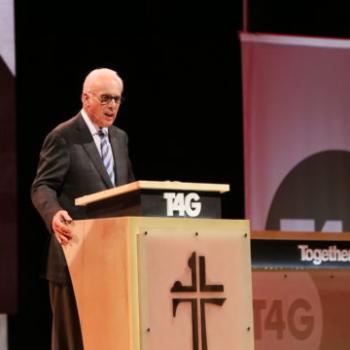This post is part of a series walking through the third volume of Abraham Kuyper’s Common Grace
At the beginning of this chapter, Kuyper gives us an overview of what he has said so far about church/state relationships in six summary theses:
- One institutional church is only possible along the model of the Roman Catholic Church, and requires state suppression of schismatics.
- This unity (of one institutional church) isn’t how history or nations work.
- Even early in church history this unity was imperfect, and had to dissolve as individual conversions happened over time.
- Even within nations there is diversity, and the government would have to choose the “true church” and eliminate the others in order to achieve this unity.
- But government can’t do this, and even attempting it would destroy the true church even if the government picked the “right” one.
- Only an absolute monarch can make such decisions anyway, given the evolutionary nature of constitutions and nations.
So government must let the church be multiform. This ultimately strengthens the “true” church and exposes the false one. Government intervention, by contrast, destroys the value of both church and state, and ultimately “leads again to crucifying of the Son of Man.” (301)
The freedom of the church “in the name of Christ” is found in Acts 4. This is an authority independent of government. (301-302) The world wants to find this right in the right to association–a right of man.
We oppose this because:
- such rights exist by state law, while the church exists by the covenant of grace. [Kuyper uses infant church membership as an example here, unwisely in my Baptist opinion.]
- The right of association is from the authority of the government, while our authority comes from Christ.
- This destroys local rights by assuming property laws govern the church, rather than the church’s overseers.
So the government must let churches maintain their own forms. This applies to churches who hold to the Creed–others have dissolved into associations and no longer operate in the name of Christ.
What about state-sponsored salaries? That’s a distraction and a “historic obligation”, not a theological point. There are points against this and in favor of it, but these are side issues. The bigger deal is that state salaries reduce the freedom of the church. Churches that support themselves are freer and more alive. Besides, that’s the Apostolic model.
What about “mixed problems,” like blue laws, education, hospitals, etc? With these, either the church leads or the government, or there is collaboration. The last option runs into the problem of multiple churches–with which should the government collaborate? And there are secular charities and other religions as well, where do they fit in to the collaborative model?
So functionally the government listens to everyone and then decides, while churches have influence through the electoral process. This might even mean more influence than the church had in the past, for that matter. So churches ought to be sure they’re shaping their members faithfully.
Dr. Coyle Neal is co-host of the City of Man Podcast an Amazon Associate (which is linked in this blog), and an Associate Professor of Political Science at Southwest Baptist University in Bolivar, MO













